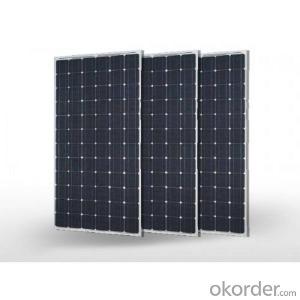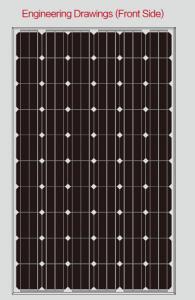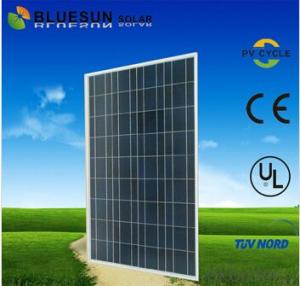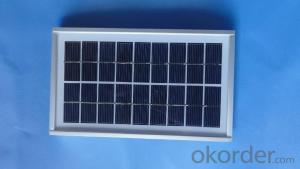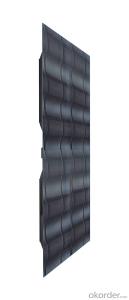SOLAR PANELS,SOLAR PANEL FOR 250w,SOLAR MODULE PANEL
- Loading Port:
- Shanghai
- Payment Terms:
- TT OR LC
- Min Order Qty:
- 2600 watt
- Supply Capability:
- 26000 watt/month
OKorder Service Pledge
OKorder Financial Service
You Might Also Like
Item specifice
Product Description:
1.Structure of Solar Module Description
Solar panel refers either to a solar hot water panel, a common type of a solar thermal collector, or to one or more solar photovoltaics (PV) modules, electrically connected and mounted on a supporting structure.
A PV module is a packaged, connected assembly of typically 6×10 solar cells. Solar PV panels constitute the solar array of a photovoltaic systemthat generates and supplies solar electricity in commercial and residential applications. Each module is rated by its DC output power under standard test conditions, and typically ranges from 100 to 320 watts. The efficiency of a module determines the area of a module given the same rated output – an 8% efficient 230 watt module will have twice the area of a 16% efficient 230 watt module. There are a few solar panels available that are exceeding 19% efficiency. A single solar module can produce only a limited amount of power; most installations contain multiple modules. A photovoltaic system typically includes a panel or an array of solar modules, an inverter, and sometimes a battery and/or solar tracker and interconnection wiring.
2.Main Features of the Solar Module
1).High conversion efficiencies resulting in superior power output performance.
2).Outstanding power output even in low light or high temperature conditions
3).Optimized design for ease of soldering and lamination
4).Long-term stability,reliability and performance
- Q:Are there any disadvantages to using solar panels?
- Yes, there are a few disadvantages to using solar panels. Firstly, the initial installation cost of solar panels can be quite high, which may deter some people from adopting this technology. Additionally, solar panels require a significant amount of space for installation, making them impractical for individuals with limited rooftop or land availability. Furthermore, solar panels are dependent on sunlight, so their efficiency can be affected by factors such as weather conditions and geographical location. Finally, the production process of solar panels involves the use of certain chemicals and materials that can have negative environmental impacts if not properly managed.
- Q:Can solar panels be used to power a space station?
- Yes, solar panels can be used to power a space station. In fact, many space stations, such as the International Space Station (ISS), rely on solar panels to generate electricity. These panels capture energy from the sun's rays and convert it into usable electrical power, providing a sustainable and renewable source of energy for the space station's operations.
- Q:Can solar panels be installed on a pergola or gazebo structure?
- Yes, solar panels can be installed on a pergola or gazebo structure. These structures provide a suitable platform for solar panel installation and can help maximize sunlight exposure for energy generation. Additionally, installing solar panels on a pergola or gazebo can serve a dual purpose by providing shade and generating clean, renewable energy.
- Q:Im curious because I read about a boy who invented a 3d solar panel, using a pyramid he designed a solar panel that collects light more efficiently. Now I have a question. Why cant I design a solar panel that takes adventage of convex and concave mirror's and use a surface that collects light and then focus's the suns energy into a beam and take the beam into a chamber where the solar panels are sitting and surround them with mirrors as well, so any light not obsorbed by one particular spot is reflected to another area for reabsorbtion. I know solar panels dont absorb light but perhaps that will allow more light to create the effects it needs.
- I don't know anything about the 3D thing. You cannot get more energy out, than goes in. Energy will only hit the mirrors. With some loss of efficiency they would reflect a focused beam into the chamber, where with some more losses would reflect it to the solar panels. It would be more efficient just to expose all the panels to sunlight.
- Q:So lets say that Everyday I use ,280 kWh. How many 250 watt solar panels would I buy so that I don't need to buy electricity anymore. Sorry if this sounds stupid, I am doing research on why american homes should become more cost efficient.
- Everyday I use ,280 kWh 280 kW-hour / 24 hours = 470 kW WOW, that is a very high power level, most homes use an average of .2 kW. My guess is that you mean you use 280 kW-hour in a year, which comes to an average power of .3 kW, typical. Assuming you get, worse case, 6 hours of sun per day, for the first case, 470 kW, each solar panel generates the equivalent of 250 x6/24 = 60 watts, so you would need 470k/60 = 8000 panels For the second case, .3 kw or 300 watts, divided by 60 that is about 20 panels. Depending on where you live, you could need as much as twice that number. Plus you need charge controller, lots of expensive batteries, and an inverter. The big problem is periods of no sun. If you demand continuous power, and you have a period of, say, 24 hours with no sun because of storms, etc, then the number of batteries increases to the hundreds.
- Q:Can solar panels be installed on water treatment plants or utilities?
- Yes, solar panels can be installed on water treatment plants or utilities. In fact, many water treatment plants and utilities are increasingly adopting solar power as a sustainable and cost-effective energy solution. Solar panels can be installed on rooftops, open fields, or even on floating platforms over water bodies, providing clean energy to power the operations of these facilities.
- Q:Are there any restrictions or regulations regarding solar panel installations?
- Yes, there are restrictions and regulations regarding solar panel installations. These can vary depending on the location and jurisdiction. Common regulations include obtaining permits, adhering to building codes and zoning requirements, maintaining a certain distance from property lines, and complying with electrical and safety standards. It is important to consult with local authorities and professionals to ensure compliance with all applicable regulations before installing solar panels.
- Q:Can solar panels be used for street lighting?
- Yes, solar panels can be used for street lighting. By harnessing the energy from the sun, solar panels can power street lights, eliminating the need for electricity from the grid and reducing carbon emissions. Solar-powered street lighting systems are increasingly being adopted as a sustainable and cost-effective solution for illuminating streets and public spaces.
- Q:My family moved into a house that came with solar power panels but they are not connected and don't really understand how to even begin.
- You need to know some electrical basics. You need to check if they are still working and determine the output voltage with the use of testers. They are just part of a system that includes other equipments as well like a controller, car batteries, inverters, diodes.
- Q:Can solar panels generate electricity during a blackout?
- No, solar panels cannot generate electricity during a blackout. This is because most solar panel systems are grid-tied and rely on the electricity from the power grid to function. When there is a blackout, the grid-tied solar panels automatically shut off to prevent any electricity from flowing back into the grid, in order to protect utility workers who may be repairing the power lines. However, it is possible to have a backup battery system installed along with the solar panels, which can store excess energy and provide electricity during a blackout.
1. Manufacturer Overview |
|
|---|---|
| Location | |
| Year Established | |
| Annual Output Value | |
| Main Markets | |
| Company Certifications | |
2. Manufacturer Certificates |
|
|---|---|
| a) Certification Name | |
| Range | |
| Reference | |
| Validity Period | |
3. Manufacturer Capability |
|
|---|---|
| a)Trade Capacity | |
| Nearest Port | |
| Export Percentage | |
| No.of Employees in Trade Department | |
| Language Spoken: | |
| b)Factory Information | |
| Factory Size: | |
| No. of Production Lines | |
| Contract Manufacturing | |
| Product Price Range | |
Send your message to us
SOLAR PANELS,SOLAR PANEL FOR 250w,SOLAR MODULE PANEL
- Loading Port:
- Shanghai
- Payment Terms:
- TT OR LC
- Min Order Qty:
- 2600 watt
- Supply Capability:
- 26000 watt/month
OKorder Service Pledge
OKorder Financial Service
Similar products
New products
Hot products
Hot Searches
Related keywords
